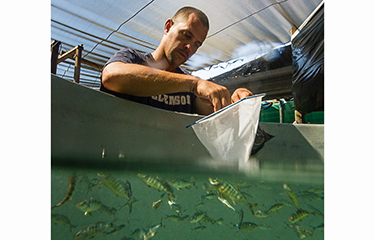A new study has shown that algae-based oils that are rich in omega-3 fatty acids can successfully replace fish oil in the diets of farm-raised California yellowtail, “without compromising growth or mortality.”
The new study was led by scientists at the Hubbs-SeaWorld Research Institute in San Diego, California, U.S.A., and funded in part by the F3 Future of Fish Feed team. The study – published in the journal Aquaculture Research – found that between groups fed a fishmeal-free diet with either fish oil, algal oil, or soybean oil and a fishmeal-fed control group, the algal oil group matched many of the performance metrics of the fishmeal-fed fish.
“These results show the potential for this species to be reared on fishmeal and fish-oil free diets,” HSWRI Research Scientist Kevin Stuart, the study's lead author, said in a press release. “More research needs to be done to make these diets cost effective for growers, but the potential is there to advance sustainable aquaculture.”
The study took place over a 64-day feeding trial, testing the three different diets. At the conclusion of the trial, the fish were analyzed for general body composition and fatty acid levels in tissues. According to the study’s abstract, fish that were fed algal oil with omega-3s had a lower weight-gain compared to the control group fed fish meal, but had a higher essential fatty-acid content in tissues compared to other fishmeal replacements.
“Based on the results from this trial, we have shown that in [California yellowtail] juvenile diets, fish oil can be replaced with algal oil with no effect on growth or survival, and fish meal can be replaced with no effect on survival and a 20 percent decrease in weight gain,” the abstract states.
While the study did find that tuna fed diets free of wild fish had slower growth than the fishmeal-fish oil control diet, it also found that the “pattern of growth” was “still excellent.”
“Overall, this study shows that algal oil can be used as a substitute for fish oil, and poultry byproduct meal and spirulina are an effective replacement for fishmeal, with a slight reduction in weight gain in the diet of juvenile [yellowtail],” the study states.
The study utilized Veramaris’s marine algal oil, which contains both omega-3 fatty acids EPA and DHA. The oil has been used in other recent studies, including one earlier this year that discovered shrimp fed the oil fared better against deadly diseases.
The authors of the latest study on California yellowtail acknowledged that the fishmeal-fed fish performed the best, but that the current results using algal oil show future potential.
“Further research needs to be done to be able to match the growth of a fishmeal and fish oil diet for this species, as well as conducting longer duration trials to determine any long-term impact of the alternative lipid and protein source,” the study states.
Photo courtesy of Hubbs-SeaWorld Research Institute







